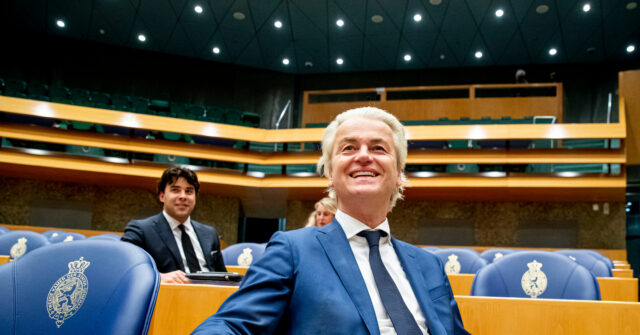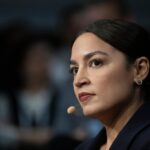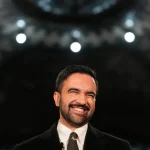

Geert Wilders, a staunch critic of Islam and the European Union, hailed a recent poll that put his anti-mass migration party tied for first place in next week’s general election as a “game changer”.
Dutch voters will head to the polls on Wednesday for a general election that could be a major signifier of the future political landscape of the European Union. The election was triggered after the fall of the globalist government of Prime Minister Mark Rutte, who announced his resignation from Dutch politics earlier this year over a dispute on migration after over thirteen years in power. Polls have suggested the likely formation of a right-wing coalition government amid growing discontent in the country over mass migration.
The mood, which has seen right-wing and populist parties surge in support across Europe, is apparently playing out similarly in the Netherlands, with a poll from Dutch pollster Maurice de Hond on Saturday showing Geert Wilder’s Party for Freedom (PVV) tied for first place alongside Rutte’s People’s Party for Freedom and Democracy (VVD), now led by Dilan Yeşilgöz-Zegerius.
Both Wilders’ Eurosceptic and anti-mass migration PVV party and the centre-right VVD were projected by the poll to secure 26 seats in the House of Representatives a piece in the general election.
Wilders, who during his 25 years in politics has long been chastised in the establishment media as “far-right” over his strident opposition to the Islamisation of the Netherlands, hailed the survey as a “game changer”, declaring that: “No one can ignore the PVV voter anymore!”
*** GAMECHANGER! ***
PVV +5 en op 26 zetels! 👍
Gedeelde 1e plaats met de VVD.
Niemand kan nog om de PVV kiezer heen! Laatste peiling van vandaag van @mauricedehond.#StemPVV #PVV pic.twitter.com/y6ATqkFpCi
— Geert Wilders (@geertwilderspvv) November 18, 2023
With 76 seats being required for a majority, it is a foregone conclusion that with a crowded field of 26 parties vying for representation, a government must be formed on a coalition basis as no single party is anywhere close to picking up enough seats to form a government outright.
Wilders has attempted to soften his image and rhetoric during the debates, saying that he is willing to shelve his hardline stances on Islam, such as banning the Qur’an and mosques, to form a coalition government and deliver on pressing priorities of the Dutch people such as reducing immigration, improving healthcare services, and tackling the growing housing crisis in the country.
It remains to be seen, however, if centre-right parties such as the Dilan Yeşilgöz-Zegerius-led VVD will be willing to form a government with Wilders. Yeşilgöz-Zegeriu, the daughter of Kurdish and Turkish migrants, has taken a stronger line on immigration than her predecessor and has so far refused to rule out joining forces with Wilders.
However, amid the surge in the polls, she has begun to levy criticisms at the populist firebrand, saying on Saturday: “On the one hand, he says that all positions can be in the trash, and on the other hand he is for a Nexit (Netherlands leaving the EU), against climate measures and then you still have his attitude towards Russia.”
“You don’t really know which Wilders you have in front of you and what it’s all about, but it’s worrying,” Yeşilgöz-Zegeriusaid.
Nevertheless, she once again refused to close the door to a potential partnership with the PVV, saying that “she does not exclude voters”.
Populism is rising across Europe as concerns over mass migration mounthttps://t.co/diOIi761gD
— Kurt Zindulka (@KurtZindulka) July 12, 2023
Meanwhile, Pieter Omtzigt, a popular centrist politician who made his bones going after corruption in the Rutte government and who has been seen as a favourite to become the next prime minister, has said that Wilders’ stance on Islam would likely rule out a partnership.
Yet, with support for his New Social Contract party faltering over the past month amid Omtzigt’s hesitance to commit to putting himself forward as his party’s candidate for PM, falling from a projected 30 seats to third place at 23, it is unclear if he will be in a position to reject joining with Wilders.
Like Yeşilgöz-Zegeriu, Omtzigt has also argued for the need to reduce immigration and has said that the importance of the issue would likely prevent him from allying with the Labor-Green Left bloc of green agenda architect and longtime Eurocrat Frans Timmermans.
Omtzigt’s insistence on not pairing with Wilders has drawn criticism from Caroline van der Plas, the leader of the upstart Farmer-Citizen Movement (BBB) party, who said earlier this week that he “should be open” to any cooperation and said that she would lobby Omtzigt on behalf of Wilders.
The BBB, which became the largest political party in the country earlier this year after a stunning performance in provincial elections, has so far not been able to replicate its success in general election polling, currently projected to pick up seven seats in the House of Representatives. Nevertheless, the BBB, which still has a strong position of power in the Senate and local governments, would be a likely coalition partner in any right-wing bloc, from which it would likely continue its pushback against the European Union’s green agenda and plans to forcibly shut down thousands of farms in the Netherlands.
Planting its flag on the populist right, the Dutch Farmer-Citizen Movement called for an “opt-out” of EU climate and migrant agreements. https://t.co/T8ErPRYEfh
— Breitbart News (@BreitbartNews) September 14, 2023





